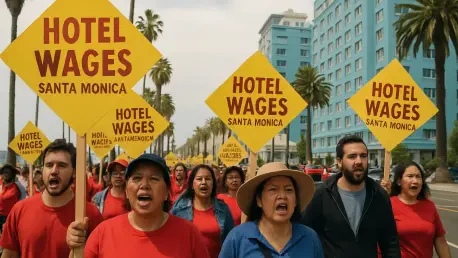In the heart of Santa Monica, California, a luxury hotel known for its opulent accommodations and breathtaking ocean views has found itself at the center of a heated legal battle that raises serious questions about labor rights in the hospitality industry. Santa Monica Proper, a high-end establishment where room rates can soar between $650 and $2,400 per night, faces allegations of failing to pay its workers the minimum wage mandated by local law. A class action lawsuit filed in the Superior Court of Los Angeles County has brought to light claims that the hotel is violating the Santa Monica Hotel Workers Living Wage Ordinance, sparking a broader conversation about fair compensation in an industry often criticized for prioritizing profit over people. This case not only highlights the struggles of individual employees but also reflects a growing tension between luxury hospitality and the push for equitable treatment of workers across California.
Unpacking the Lawsuit Against Santa Monica Proper
Allegations of Wage Violations
The core of the legal action against Santa Monica Proper revolves around accusations that the hotel has consistently underpaid its employees, disregarding the specific wage requirements set forth by the Santa Monica Hotel Workers Living Wage Ordinance. This local regulation, designed to protect hotel workers, establishes a tiered minimum wage structure, currently set at $21.01 per hour. The lawsuit contends that many workers at the hotel earn far less than this mandated rate, a discrepancy that starkly contrasts with the exorbitant prices guests pay for a single night’s stay. Plaintiffs Chelsea Kupitz and Eric Block, both current employees, have become the faces of this struggle, representing a workforce that feels undervalued despite contributing to the hotel’s luxury reputation. Their claims paint a picture of financial hardship, with some workers allegedly earning less per hour than the cost of a small appetizer on the hotel’s upscale menu, underscoring the perceived inequity.
The Hotel’s Defense and Counterarguments
In response to the allegations, Proper Hospitality, the operator of Santa Monica Proper, has firmly denied any wrongdoing, asserting that they adhere to a collective bargaining agreement (CBA) with the union representing their employees. According to a spokesperson, this agreement provides competitive compensation, along with benefits such as comprehensive healthcare and retirement pension contributions, which they argue surpass the requirements of the local ordinance. This defense introduces a complex layer to the dispute, suggesting that the hotel’s obligations under the CBA may differ from the city’s wage mandates. While the specifics of whether the CBA legally supersedes local law remain unclear in public discourse, the hotel’s stance highlights a potential loophole or alternative compliance mechanism that could influence the outcome of the lawsuit. This perspective shifts some focus away from direct wage figures to the broader package of employee benefits, raising questions about how fairness is measured in such agreements.
Broader Implications for Hotel Workers in California
Statewide Push for Fair Compensation
Beyond the walls of Santa Monica Proper, the fight for fair wages among hotel workers is gaining momentum across California, with several cities implementing specific minimum wage ordinances tailored to the hospitality sector. In Los Angeles, for instance, a plan is in place to raise the minimum wage for hotel workers to $30 per hour by 2028, aligning with major events like the Olympic Games. However, this initiative has faced significant pushback from hotel associations and travel providers, leading to a temporary pause in enforcement due to a petition aiming to overturn the ordinance. Such resistance reflects a broader industry concern about the financial sustainability of mandated wage hikes. Meanwhile, labor advocates argue that these increases are essential for workers who often struggle to make ends meet despite working in an industry that generates substantial revenue from affluent clientele, pointing to a systemic imbalance in how profits are distributed.
Lessons from Other Legal Battles
Recent legal outcomes in other California cities further illustrate the ongoing struggle for hotel worker rights and the varied responses from industry players. In Long Beach, a notable settlement saw Hyatt Hotels pay $2.25 million for violating a local “Housekeeper’s Bill of Rights” law, signaling that legal accountability can yield tangible results for workers. This case, among others, underscores a pattern of challenges and resolutions that shape the landscape of labor rights in hospitality. Unions like Unite Here Local 11 have been instrumental in pushing for these protections, amplifying the voices of workers who might otherwise go unheard. The contrast between successful settlements and ongoing disputes, such as the paused ordinance in Los Angeles, suggests that while progress is being made, resistance from powerful industry stakeholders remains a formidable barrier. These examples provide a backdrop to the Santa Monica Proper case, highlighting the interconnected nature of local policies and legal precedents in shaping worker compensation.
Looking Ahead to Sustainable Solutions
Reflecting on the past actions taken in this dispute, it’s evident that the allegations against Santa Monica Proper stirred significant debate about wage fairness in luxury hospitality. The lawsuit brought attention to the stark disparities between high-end pricing and employee pay, while the hotel’s defense emphasized alternative forms of compensation through union agreements. Moving forward, a balanced resolution could involve clearer legal guidelines on how collective bargaining agreements interact with local ordinances, ensuring that neither workers nor businesses are left in ambiguity. Additionally, fostering dialogue between labor unions, hotel operators, and policymakers might pave the way for sustainable wage models that support workers without overburdening businesses. As California continues to grapple with these issues, the outcomes of such cases could set important precedents, potentially influencing national conversations about labor rights in industries built on service and luxury.









